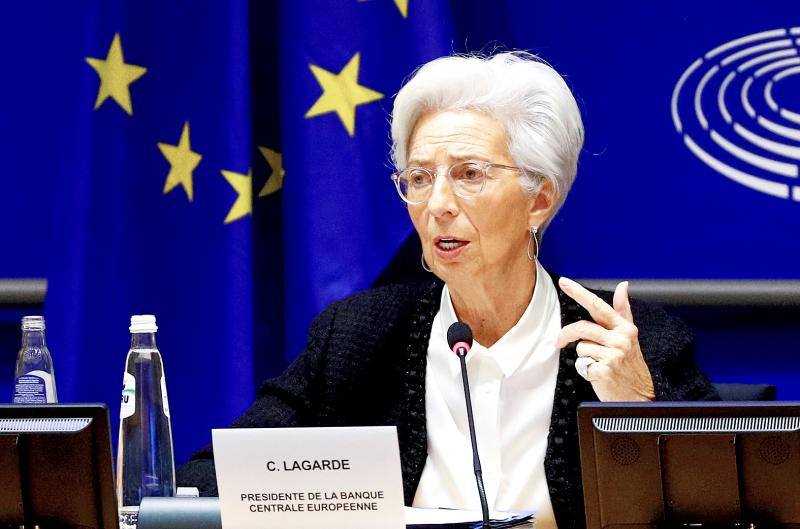The European Central Bank (ECB) “should be prepared” to possibly launch a digital currency, ECB President Christine Lagarde said yesterday, adding that the public would be asked to weigh in on the issue.
The Frankfurt, Germany-based bank is to carry out a series of experiments with a digital euro over the next six months and launch a three-month public consultation from Oct. 12.
A decision on whether to move ahead with a virtual currency project is expected in about the middle next year, it said.

Photo: Reuters
“Our role is to secure trust in money... We should be prepared to issue a digital euro, should the need arise,” Lagarde said in a statement.
This digital currency would “complement cash, not replace it,” the statement said.
The move comes as people increasingly pivot toward cashless payments, and the ECB is wary of falling behind so-called cryptocurrencies issued by private players like bitcoin and Facebook’s yet-to-be-launched Libra.
A digital currency would allow individuals as well as companies to have deposits directly with a central bank, potentially safer than with commercial banks, or cash that could be stolen.
The ECB’s deliberations echo those of the US Federal Reserve, which has been researching a digital dollar.
The People’s Bank of China in April started experimenting with digital currency in four cities.
Proponents of cryptocurrencies say they allow for faster and cheaper payments, especially across borders, as they cut out the staff, administration and the high costs needed in traditional banking and investment.
Governments in Europe have insisted that any digital currency would require careful supervision.
“A digital euro would support Europe’s drive towards continued innovation. It would also contribute to its financial sovereignty and strengthen the international role of the euro,” ECB executive board member Fabio Panetta said.
Many hurdles remain, including concerns about privacy and the impact on traditional banking and financial stability, Panetta said.
However, “a properly designed digital euro could address these risks,” he said.
The COVID-19 pandemic has accelerated the shift toward electronic payments, as people avoid notes and coins over fears that they might spread the novel coronavirus.
The ECB applied to trademark the term “digital euro” late last month, Bloomberg News reported.

‘SWASTICAR’: Tesla CEO Elon Musk’s close association with Donald Trump has prompted opponents to brand him a ‘Nazi’ and resulted in a dramatic drop in sales Demonstrators descended on Tesla Inc dealerships across the US, and in Europe and Canada on Saturday to protest company chief Elon Musk, who has amassed extraordinary power as a top adviser to US President Donald Trump. Waving signs with messages such as “Musk is stealing our money” and “Reclaim our country,” the protests largely took place peacefully following fiery episodes of vandalism on Tesla vehicles, dealerships and other facilities in recent weeks that US officials have denounced as terrorism. Hundreds rallied on Saturday outside the Tesla dealership in Manhattan. Some blasted Musk, the world’s richest man, while others demanded the shuttering of his

TIGHT-LIPPED: UMC said it had no merger plans at the moment, after Nikkei Asia reported that the firm and GlobalFoundries were considering restarting merger talks United Microelectronics Corp (UMC, 聯電), the world’s No. 4 contract chipmaker, yesterday launched a new US$5 billion 12-inch chip factory in Singapore as part of its latest effort to diversify its manufacturing footprint amid growing geopolitical risks. The new factory, adjacent to UMC’s existing Singapore fab in the Pasir Res Wafer Fab Park, is scheduled to enter volume production next year, utilizing mature 22-nanometer and 28-nanometer process technologies, UMC said in a statement. The company plans to invest US$5 billion during the first phase of the new fab, which would have an installed capacity of 30,000 12-inch wafers per month, it said. The

MULTIFACETED: A task force has analyzed possible scenarios and created responses to assist domestic industries in dealing with US tariffs, the economics minister said The Executive Yuan is tomorrow to announce countermeasures to US President Donald Trump’s planned reciprocal tariffs, although the details of the plan would not be made public until Monday next week, Minister of Economic Affairs J.W. Kuo (郭智輝) said yesterday. The Cabinet established an economic and trade task force in November last year to deal with US trade and tariff related issues, Kuo told reporters outside the legislature in Taipei. The task force has been analyzing and evaluating all kinds of scenarios to identify suitable responses and determine how best to assist domestic industries in managing the effects of Trump’s tariffs, he

Taiwan’s official purchasing managers’ index (PMI) last month rose 0.2 percentage points to 54.2, in a second consecutive month of expansion, thanks to front-loading demand intended to avoid potential US tariff hikes, the Chung-Hua Institution for Economic Research (CIER, 中華經濟研究院) said yesterday. While short-term demand appeared robust, uncertainties rose due to US President Donald Trump’s unpredictable trade policy, CIER president Lien Hsien-ming (連賢明) told a news conference in Taipei. Taiwan’s economy this year would be characterized by high-level fluctuations and the volatility would be wilder than most expect, Lien said Demand for electronics, particularly semiconductors, continues to benefit from US technology giants’ effort